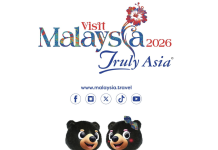KUALA LUMPUR, 24 October 2025: Travellers are rewriting the rulebook on why they travel, opting for meaning over mileage, and experiences over rote itineraries.
Trip.com Group and Google explore this shift in Why travel?, a new global consumer report that examines the intersection of purpose, people and place in travel.

The report suggests Kuala Lumpur is reinventing itself as a global fashion hotspot. At the same time, 66% of Malaysians now combine concerts or festivals with family vacations — redefining how we travel in 2026 and beyond.
By combining Trip.com Group’s global booking intelligence and proprietary booking data with Google’s research and search insights, the report uncovers how travellers are seeking deeper purpose and richer connections through culture, community, and technology to create more experience-focused journeys in 2026 and beyond.
The Why Travel report highlights five key themes that are shaping tomorrow’s journeys: Travel as Expression (where identity and aesthetics drive choices), Travel with Purpose (where curiosity and meaning replace cookie-cutter itineraries), Travel to Heal (where wellness and restoration become the agenda), Travel to Connect (where music, sport, and multigenerational moments bring people together), and Travel of Tomorrow (where AI and immersive technologies redefine inspiration and discovery).
Key Insights from the Why Travel? Report
Travel as Expression: Social media drives travel bookings. Events like Fashion Week amplify the importance of “being there”, with Google searches for “how to get invited” leaping 190% year-on-year (YoY). New destinations are rising in popularity, with Kuala Lumpur, Stockholm, and Dubai joining the ranks of traditional fashion week cities like Paris, Milan, and New York.
Travel to Connect: Travel is no longer a solo pursuit; it’s a shared experience. Friends, families, and fan communities are influencing where people go, with concerts and sports as key travel drivers. Among Malaysian travellers, 66% are combining concerts or festivals with vacations in family groups, while football (62%), Formula 1 (42%), and basketball (31%) are the most popular sports to combine with travel.
Travel with Purpose: Travellers increasingly crave cultural experiences with a more thoughtful sense of exploration. Google searches for “Japanese tea ceremonies” show a 53% YoY increase, demonstrating the desire for unique experiences that inspire.
Travel to Heal: Wellness trips are evolving – from vacation side activities to the main event. According to Google Trends, searches for “spa destination experiences” grew by 140% YoY. This health-centric agenda is also extending into the realm of medical tourism, as searches for “what is medical tourism” and “meaning of medical tourism” climbed 90% and 60% YoY, respectively.
Travel of Tomorrow: Technologies like AI become the co-pilot as consumers’ confidence in using technology to plan a trip grows. “Help planning my trip” searches grow by +190% YoY.
“Travel in 2026 will be more than movement; it’s about meaning. At Trip.com Group, we are seeing travellers fly across the globe for fitness events, discover cities through local food scenes, and make booking decisions driven by social influence. By working with Google, we uncover the cultural shifts that explain not just where people go, but why they travel,” said Trip.com Group Vice President Han Feng.
As community becomes a core booking motivator and AI-first travel continues to increase, Trip.com Group is doubling down on comprehensive concert travel packages and expanding its AI-driven planning tools, such as Trip.Planner to deliver seamless, personalised journeys. Looking ahead, the next wave of consumer growth will be driven by emotional alignment, cultural fluency, and tech-enabled flexibility – the foundations of the future of travel.
“We’re seeing a clear shift in how and why people explore the world, seeking deeper purpose, richer connections and experiences enhanced by technology. Google’s AI tools, such as Gemini, AI Mode on Search, and Google Translate, are emerging as travel collaborators to help people plan and make decisions. AI is an essential tool also for the industry, enabling partners like Trip.com Group to capture the immense opportunities that lie ahead in 2026 and beyond,” said Google Managing Director, Greater China LCS Specialists team, Joyce Zhang.






